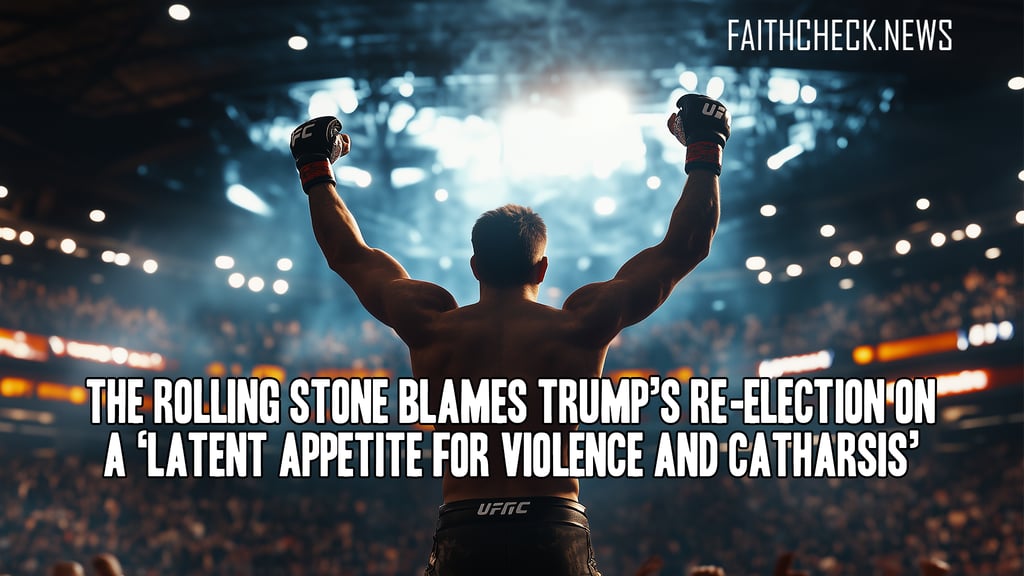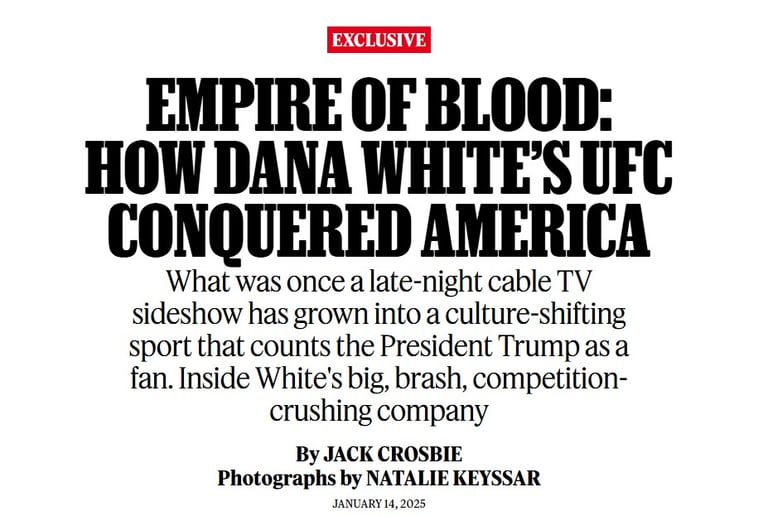The Rolling Stone Blames Trump’s Re-election on a ‘Latent Appetite for Violence and Catharsis’
Is Trump's America a resurrection of violence, or a rejection of Wokism?
NEWSFAITH
1/15/20253 min read


Does the rise of the UFC stem from a “latent appetite for violence and catharsis”? Or is the passion for fighting sports driven by an innate desire to find purpose and answer the deep-seated question: “Do I have what it takes?”
A culture untethered from a securely anchored worldview offering a clear and just moral standard will often swing from one extreme to the other. Today’s struggle to define what it means to be a man illustrates how far we have drifted from God’s intent.
The Rolling Stone published an intriguing article arguing that the rise of “Trump’s America” can be attributed to a “latent appetite for violence and catharsis.”
Jack Crosbie of Rolling Stone believes that Donald Trump, Dana White, and Joe Rogan built their empires in politics, mixed martial arts, and as a prominent social commentator, respectively, on a “bloody version of the American dream: that any given fight could be your highlight-reel knockout, your big break.”
It’s true that Trump saw the potential for growth and demand among today’s youth. Crosbie quotes Trump:
“Nobody wanted to give him arenas because they said it’s a rough sport — a little rough,” Trump said at his election-night victory party last year, recounting his meeting with White before ushering him onstage. “I said, ‘This is the roughest sport I’ve ever seen,’ and I began to like it.”
Dana White, President of the UFC, added: “Trump got it. Think about where the Trump brand was and where the UFC brand was. Not only did he get it — he also showed up for both events. He was there for the first prelim of the night, and he stayed through the main event.”
What united these three men was the belief that a little-known, barely regulated blood sport could tap into America’s latent appetite for violence and catharsis. Two decades later, they’ve been proven right, with their gamble placing them at the center of one of the most extreme political realignments in a century. To understand Trump’s America, Crosbie argues, you have to understand the UFC.
The implication of Crosbie’s essay is that Trump leveraged humanity’s worst impulses to win re-election and that his America First agenda will likely lead to violence and chaos.
Crosbie rightly points out that young men and women are embracing fighting sports for entertainment and to live out, by proxy, a deep-seated need to feel that their lives matter. However, he never fully explains the premise of “America’s latent appetite for violence and catharsis.” It’s as if he pressed the easy button, simplifying how so many young people voted for Trump by painting them as Neanderthals eager to play with fire and club their neighbors for sport.
Did he consider that decades of wealth, leisure, and helicopter parenting — which promote a worldview that life is meant to be safe and protected — have failed to answer the deeper question of why we exist?
John Eldridge suggests that men have three core needs: a battle to fight, an adventure to live, and a beauty to rescue. He posits that the core question a man seeks to answer is, “Do I have what it takes?”
Perhaps the rise of fighting sports like the UFC and Trump’s re-election are better attributed to a rejection of the Nanny State, micromanaged parenting, and woke ideology, which teach men to embrace weakness and focus on their feelings. Are they truly embracing violence, or are they rejecting a system that shames men for wanting to win, achieve, and live an adventurous—even dangerous—life?
Undoubtedly, today’s young adults are searching for something more. The more pressing question may be: Do Christians get it? Do we see the opportunity to answer the question, “Do I have what it takes?”

Faith Check News
Curating daily news stories for Christian readers.
CONNECT OTHERS
© 2025. All rights reserved.


